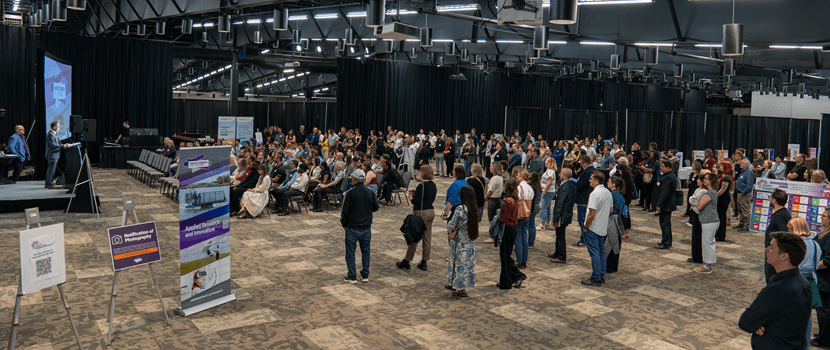Imagine a vibrant room buzzing with excitement as over 100 students showcase their innovative solutions to real-world problems. This was the scene at Saskatchewan Polytechnic's Applied Research Student Showcase, where creativity and practicality met to address pressing challenges in various industries.
Innovative Solutions for Real-World Problems
The showcase was a testament to Sask Polytech's growing reputation in applied research, with projects evaluated by faculty, industry experts, and community partners. From senior care to sustainable agriculture, students tackled a wide array of issues, demonstrating their readiness to step into the workforce with practical solutions in hand.
One standout project was the development of the Caker Care Home Portal App, designed to improve the quality of life in senior care homes. Another project focused on overcoming barriers to outdoor play in early childhood education, highlighting the importance of play in children's development.
Enhancing Efficiency and Sustainability
Students didn't stop there. They delved into environmental issues with research on the effects of cover crops on soil fertility in Saskatchewan. Meanwhile, others optimized lab practices for analyzing brine in Mosaic's QC laboratory, showcasing their ability to enhance efficiency and sustainability in industrial processes.
Projects like viscosity testing of guar gum for potash production and the redesign of aeroponic towers for sustainable agriculture reflect a commitment to advancing technology and design. These projects aim to improve user experience and promote sustainability across various sectors.
Smart Solutions for Urban Challenges
Urban mobility and sustainability were also on the agenda, with students developing an AI-powered platform for real-time parking availability in Saskatoon. This innovative system aims to reduce parking search time, thereby decreasing traffic congestion, fuel usage, and emissions. It's a smart solution that could transform urban living.
"Our students are not just learning about the world—they're actively working to improve it," said Dr. Larry Rosia, President and CEO of Saskatchewan Polytechnic. "Their projects demonstrate the power of applied research in creating practical solutions that benefit our communities and industries."
Through collaborations with industry and public sectors, Sask Polytech ensures that students not only gain valuable experience but also contribute to ongoing innovation. By retaining intellectual property with industry partners, the institution fosters a culture of collaboration and continuous improvement.
Originally published at https://saskpolytech.ca/news/posts/2025/students-tackle-real-world-issues-at-research-showcase.aspx
ResearchWize Editorial Insight
The article about Saskatchewan Polytechnic's Applied Research Student Showcase is a beacon of inspiration for both students and researchers, highlighting the transformative power of applied learning and collaboration. For teachers, this showcase serves as a reminder of the profound impact that hands-on, real-world projects can have on students' learning experiences. It underscores the importance of creating classroom environments that encourage innovation, critical thinking, and problem-solving—skills that are essential in today's ever-evolving world.
In the classroom, fostering a culture where students feel empowered to tackle real-world issues can lead to meaningful engagement and a deeper understanding of the subject matter. This approach not only prepares students for future careers but also instills a sense of responsibility and capability to contribute positively to society. Teachers can draw from this example to integrate project-based learning, where students can explore topics that matter to them and their communities, thus making learning more relevant and impactful.
For researchers, the article emphasizes the value of applied research in bridging the gap between academia and industry. It showcases how collaboration with industry partners can lead to practical solutions that address pressing challenges. This is particularly important in fostering an inclusive research environment where diverse perspectives and expertise come together to drive innovation.
Moreover, the projects highlighted in the article, such as the Caker Care Home Portal App and AI-powered urban mobility solutions, reflect a commitment to inclusivity and sustainability. These initiatives demonstrate how research can be directed towards creating a more equitable and sustainable future, addressing the needs of various communities, including seniors and urban dwellers.
In essence, the article serves as a call to action for educators and researchers alike to embrace applied research and collaborative learning as pathways to not only enhance educational experiences but also to contribute to societal progress. It's a reminder that when students are given the tools and opportunities to engage with real-world problems, they can become powerful agents of change.
Looking Ahead
Inclusion will be the soil that supports every learner. AI education will strive to be accessible to all, recognizing and valuing the contributions of students from varied backgrounds. This inclusive approach will ensure that the technologies we develop reflect a wide range of perspectives and needs, leading to solutions that benefit everyone.
The emotional side of schooling will be the gentle rain that encourages resilience and curiosity. As students navigate the complexities of AI, educators will focus on fostering emotional intelligence alongside technical skills. By creating a supportive environment where students feel valued and understood, we can help them build the confidence to explore new ideas and take risks.
Together, these elements will nurture a future where AI education is not just about mastering technology but about growing together as a community, ready to tackle the challenges of tomorrow with empathy and innovation.
Originally reported by https://saskpolytech.ca/news/posts/2025/students-tackle-real-world-issues-at-research-showcase.aspx.
Related Articles
- Top A.I. Researchers Leave OpenAI, Google and Meta for New Start-Up
- University Libraries to offer four virtual tutorials in new Generative AI series
- Faculty-student duo illuminate generative AI’s potential to transform computer science education
📌 Take the Next Step with ResearchWize
Want to supercharge your studying with AI? Install the ResearchWize browser extension today and unlock powerful tools for summaries, citations, and research organization.
Not sure yet? Learn more about how ResearchWize helps students succeed.

